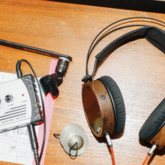Her breakthrough came under the moniker Noonie Bao, on which collabs with Avicii and a nomination for Best New Artist at the GRAMMYs 2013 followed. Due to stage fright, however, she began to move beyond the spotlight. Today, the studio back home in Los Angeles is where she feels the safest.
Jonnali Parmenius is on a songwriter boot camp in Palm Springs, LA with three colleagues. She describes the getaway as a perfect way to ”get in the zone” with her team and focus only on the creative process. A state of mind that fits Jonnali, more known by her alias Noonie Bao, perfectly. Since the record debut in 2012, she has gradually transitioned to writing music as a full-time job.
- I thought about what felt more fun – that’s what you can get good at. Since I was twelve, the best thing has always been to sit in the studio and write songs. I have to do what makes me feel good. That’s what’s so great about music, to not have to think and just exist in the present.
It’s a Scandinavian crew that’s gathered in the desert outside of Los Angeles: Norwegian topliner Caroline Ailin, Danish producer Sylvester Larsen (Sly), Jonnali, and her colleague for the past ten years, Swedish songwriter/producer Linus Wiklund (Lotus IV).
- Right now, here in Palm Springs, we’re just playing around and throwing ideas without having to think about them that much. It’s easy to, after some time in LA, be affected by what’s being played on the radio and what people are listening to. When we went here, we decided to turn it all off, says the 32-year old who never wants music to stop being playful. When it does, the songs won’t be as good.
Passion and playfulness have been her motivation since childhood. Jonnali would wake her parents in the middle of the night with fresh ideas for songs, which she recorded on a huge boom box. Soon after, she got her own recorder that wasn’t quite as loud.
- I imagine it was a relief for my parents, Jonnali says and laughs.
The first studio, shared with Linus Wiklund, was in a basement on Södermalm, Stockholm. The hours of the day were split between the basement and paid jobs, such as tennis coaching and being a personal assistant. Ideas were born during the day and recorded at night.
- The joy of songwriting is the reason I continued, says Jonnali Parmenius. Especially during those 10-15 years when I earned nothing. I asked myself countless times what I was doing, sitting in that basement. Linus and I encouraged each other, and I got to talk to myself. Even if I would never get to publish any song, I would still want to write every day. It’s so incredibly fun.
The reason behind moving to the US was a search for more collaborations and a creative sanctuary. The collabs with, among others, Tim Bergling (Avicii) gave Jonnali her first commercial success with songwriting on Fades Away and I Could Be the One. Compared to back home in Stockholm, the work environment in LA enabled a better focus. But the move was never a goal in itself.
- I didn’t think I would end up in LA. The goal was just to get the songs out into the world.
How did it feel to get the first Stim money after all those years in the basement?
- It was a big step to be able to quit the other jobs. For a long time, I converted the royalties I got into rent payments on the first apartment. It became kind of a currency – this payment equals x months’ worth of rent.
Today she lives in a house with her own studio on the border between Studio Hills and Hollywood Hills. The creative process is different from day to day, but Jonnali always returns to one important element which she calls ‘the feeling’.
- It’s an experience of ‘it’s right’, it feels right. As late as yesterday, here in Palm Springs, we created that magic that you aim for in every session. You can see it in each other’s eyes, you can’t fake it. When the lyrics and melody just really work together – this is what we wanted to say.
Creating music with artists works best in her own studio.
- There’s a whole lot of layers that peel away at my house. There can’t be any weird pressure at all. And also, I often work with Linus Wiklund. Creating an environment that feels safe and fun isn’t hard for us.
Jonnali prefers to sit in the studio during the days.
- I try to make sure I take breaks, even though it’s hard when you’re in the zone. You hear the music differently when you get away and come back to them.
Once in Los Angeles, the possibility of collaborations increased significantly compared to when she lived in Stockholm. This resulted in an unexpected turn in the songwriting. Sitting in a room for hours to write music with others hasn’t always been the natural way for Jonnali. Before moving to the States, she found it hard to imagine collective writing – the kind of writing she now prefers.
- I just felt that it was an incredibly private process and felt exposed and vulnerable by the sheer thought of it. But the relationships I’ve made through writing with others are invaluable to me, the people I’ve worked with here in LA have become my best friends. We’ve come here from all over the world. Our common trait is the passion for songwriting. After being stuck in that basement, it’s really cool to be in a city where you get to meet all these people. It gives me inspiration.
Daring to do sessions with others is a subject she returns to, as well as the lessons she’s learned from the group of talented songwriters now gathered in Los Angeles.
- Right from the start, I evolved in a totally different way.
Another reason for choosing USA as her workplace was the opportunity to get better at English. She says that Americans are more focused on the lyrics, to tell a story. She continues by saying that a good collab is built on a couple of principles. One of them is being able to listen to the whole group.
- To not be a selfish songwriter, focused on your own ideas. If someone has a vision, you need to be open to it. It’s just like every other workplace. If not, you’ll be writing alone.
Trust and loyalty is another principle.
- The relationships created in a session are built on vulnerability. It’s like therapy, you really have to open up. If you talk about personal stuff there’s an implied rule that it stays in the room, according to me. It feels important.
To an aspiring songwriter wanting to try out Los Angeles, the local scene’s musical hierarchy can seem a bit terrifying. Where do you begin? A piece of good advice is to not go there empty-handed.
- I think it’s good to have already published one or two songs with another artist. It’s easier to get sessions then. A publishing house that can help you is good too, and a connection to get you in the room.
In the Swedish songwriting community in the US it feels like everybody knows everybody, even if not everyone works together.
- You could just go here for a week or two and get some inspiration. I mean, you could technically write anywhere in the world. But it’s always fun to meet other Swedes that are in town. There are so many songwriters in LA. You can work every day of the week or more if you want to, there are so many opportunities. If you work hard enough.
Jonnali recommends newcomers to spend more time in sessions than in meetings.
She hasn’t experienced any sexism in the job so far.
- But I’ve heard stories, and it really sucks. I hope and believe that it’s about to change, though. I’ve chosen not to do most of the business parts, it ruins all my creativity. I spend most of my time in the studio, writing, and mostly meet the people I write with. And they are good people.
Nowadays, she works five days a week and keeps the weekends free for playing tennis or going to the movies. But that’s not how it always was. In the beginning, spare time and hobbies were not a part of the LA life.
- When I first got here, I worked too much. There were just so many opportunities. I got completely washed-up. There was one period when I couldn’t even get out the door. I wanted to go to the studio, but I couldn’t. My body just said no, Jonnali says.
- It took a while for me to get back, but my manager and I decided that health is always the number one priority. It felt important just to say that out loud.
Since then, Jonnali has learned to turn the flow of ideas on and off like a switch. She forces herself to take breaks, to be able to miss the writing.
- I work a lot with mental techniques. My brain is my best friend and my worst enemy. You’re constantly looking for that boost, that song, that idea. There’s nothing like the feeling of turning an idea in to reality. It’s like an addiction. But it’s important to have another life, too. Another reality. I’ve seen a lot of negative sides of the music industry. It won’t matter if you have a song that gets played and is really good if you’re all washed-up and tired. You won’t think it’s fun.
To showcase her music, Jonnali started by stepping onto the stage as her artistic alias – the singer Noonie Bao. The debut album I am Noonie Bao made her nominated to Best New Artist at the GRAMMYs in 2013, followed by performances on TV and a tour. But the breakthrough that artists dream about were for Jonnali only connected with uneasiness.
- The reason that I didn’t choose the artist life is because of my stage fright, she says. It’s part of the job as an artist to be seen, but I think the songs should be in the spotlight. I like it better in the shadows of the studio, she smiles.
She tried to master the stage fright in different ways. Recorded positive messages to herself on the phone, like ”this went really well!”, that she tried to listen to before every show. The anxiety became unmanageable and struck long before every performance. Where it came from, she doesn’t know.
- Ever since I was a kid, I’ve had times when I just wanted to be by myself. It’s not really social anxiety, but maybe something similar.
One of the first times she was in LA, she was invited to a session.
- They had heard I Could Be the One with Avicii. I put so much pressure on myself, I had to throw up. You had to perform, you know.
The way out of the anxiety was, strangely enough, to expose herself to others through creating music.
- It’s funny that what I thought I never wanted to do, write music with others in a situation where I’d be totally exposed, is where I feel the most calm and safe today. The studio is a safe place for me.
Jonnali Parmenius has learned to avoid things that steal attention throughout the years. To never stop playing. To be vulnerable, and to rest sometimes. And to surround herself with the right people. She seems to have found the right place, both physically and mentally. But letting go of the demands on herself has taken a lot of time.
- It feels so good to have gotten past that now. Being hard on yourself doesn’t exactly make the best songs. You have to dare to be bad, and to come up with bad ideas too. Sometimes, that’s how you make something really good.
Jonnali ”Noonie Bao” Parmenius
Age: 32 years
Lives: Los Angeles
Career: debuted in 2012 with I am Noonie Bao. Were one of the songwriters behind Avicii’s I Could Be the One, in which she also sang. Awarded with a swedish Grammy 2018. In 2019, she is one of Sweden’s most successful songwriters.
In Jonnali’s headphones right now: ”If my head is empty, I listen to songs that I like. Right now, it’s Radiohead’s Everything In Its Right Place, it has a feeling that I think is magical. I’d like to create that feeling in a song.”
Songwriters that have inspired Jonnali: “Jeff Buckley, the Grace album. His voice feels almost alien, and the emotion of the songs is so free. As if he just wrote down what he felt in exactly that moment.”
Three ingredients in a hit:
Instant recognition – a clear, unique identity.
Catchiness. A catchy tune that still stands out.
A small part that’s disturbing.
Stim facts:
Compositions registered at Stim: 279
First registered composition: Streets


